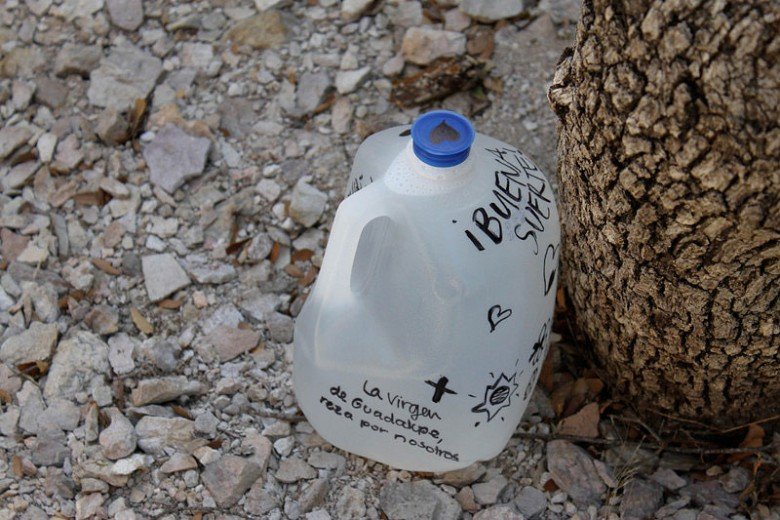It is snowing in Buffalo. The streets are slick and we huddle inside our down jackets and in front of radiators and heat vents. Half a nation away, however, it is hot, starkly beautiful, and can be dangerous if your skin is brown. A Buffalo woman has one foot on the Canadian border and the other on the border on which Trump is planning to build a wall.
As immigration and border security debates roil in the House and the Senate, Trudy Cusella is headed to El Comedor. It's an aid station run by the Jesuits and staffed by Sisters of the Eucharist near Nogales - both Nogales, Arizona and Nogales, Mexico. El Comedor is a bi-national project run by American and Mexican Catholic clergy and nuns. Every Tuesday during her stays in Arizona she accompanies her friend Peg Bowdon and the Green Valley Samaritans as they walk through the sere desert and across the border into Mexico. Something akin to swimming upstream, but much hotter and drier. They walk because the lines of cars trying to enter the U.S. are too long.
They arrive at El Comedor where migrants who have been recently deported or who are determined to attempt a desert crossing are offered food and water, shoes to replace the ubiquitous flipflops, and first aid for blisters and sores.
Small Samaritan emergency stations dot the desert and are kept supplied with food and water by volunteers. But this humanitarian aid is increasingly being destroyed. Slashed gallon water jugs litter the desert floor around these stations.
Peg Bowden is a nurse, an artist and a writer. Bowden and Cusella met years ago when both lived in the Pacific Northwest. Then Bowden moved home to Tucson and Cusella moved home to Buffalo. The friends get together regularly, usually in Arizona.
Living 12 miles from the Mexican border, Bowden has become very involved in border issues and with the migrants. Every migrant has a story. Both her blog, La Frontera, and her book, A Land of Hard Edges, tell the compelling stories of migrants who Bowden has met and interviewed at El Comedor. "Most are coming across the border because they have family in the U.S., although some come searching for work and opportunity." Bowden is now writing a second book about a migrant they found lost and badly dehydrated near their remote Arizona ranch. He was eventually deported. Bowden has visited him in his native Guatemala.
Humanitarian aid can take many forms, not all of them food, water and first aid. When the Border Patrol finds a body, says Cusella, they call the medical examiner who it marks where it was found, and tries to identify it. Friend and fellow activist, Sister Judy Bourg and her group then goes out and plants a cross where the body was found and holds a ceremony by a Yaqui holy man to honor the dead. Cusella has written a compelling account of one such cross planting that she attended several years ago.
Even though the number of border crossings is down significantly, the death toll on the border continues to rise. According to a report on The Takeaway today, "The U.S. Border Patrol apprehended 341,084 people along the 1,954 mile border between the U.S. and Mexico last year. That's a 44 percent drop from 2016. But while the number of migrant crossings has dropped, the number of deaths increased in the past year, up to 412 from 398." That's one to two people a day who die. In Dark Crossings: Life and Death Along the U.S.-Mexico Border, the reasons behind the shift, and why the border is more dangerous now than ever, is discussed with Francisco Cantu, who has written about his experience as a border patrol agent between 2008-2012 in his new book, “The Line Becomes a River.
Cusella and Bowden attended a meeting requested by the Samaritans and other groups with the new Border Patrol Tucson section chief last week at a church in Tucson. "People are angry about water bottles being slashed and aid stations being damaged. The new chief insisted that there would be disciplinary action and that it would stop. But the hard line in Washington by the Trump adminstration has given rogue officers tacit permission to harass," reports Cusella. "It’s a felony to transport a migrant, but it’s legal to give them emergency, humanitarian aid." Trump has ordered the Border Patrol to arrest aid workers.
"I feel like the Border Patrol is between a rock and hard place," says Cusella. "They have to obey the law of the land. If someone is in the country illegally, they have to arrest them. But I think that most want to do it humanely," reflects Cusella, whose brother was on the Border Patrol.
"The nuns and the Samaritans at El Comedor give the migrants information regarding the hardships and perils of the desert. If the migrants decide to go ahead and attempt to cross, then the Samaritans will help make their journey safer with equipment and supplies, and find them when they are lost," says Cusella. "If someone decides to give up and turn back, they will assist them to return home with maps and money for food and bus tickets."
Women and children can be housed at a nearby shelter. Close to El Comedor is an overpass. Shade is like gold in the desert. Cusella recalls the ground under the overpass: it is littered with sleeping bags and other detritus cast off by migrants who rest there before attempting their perilous trek across the desert.
"We're going to Altar, a mountain village, next week, to do some first aid and help out for a day," says Cusella. Many migrants begin their journey at Altar. Some will make it, others will not. The Samaritans try to make it less likely that they will die in the process.
Not quite like a jaunt across the Peace Bridge.

